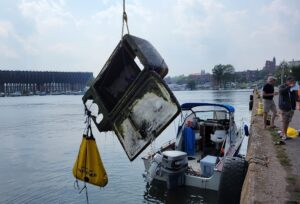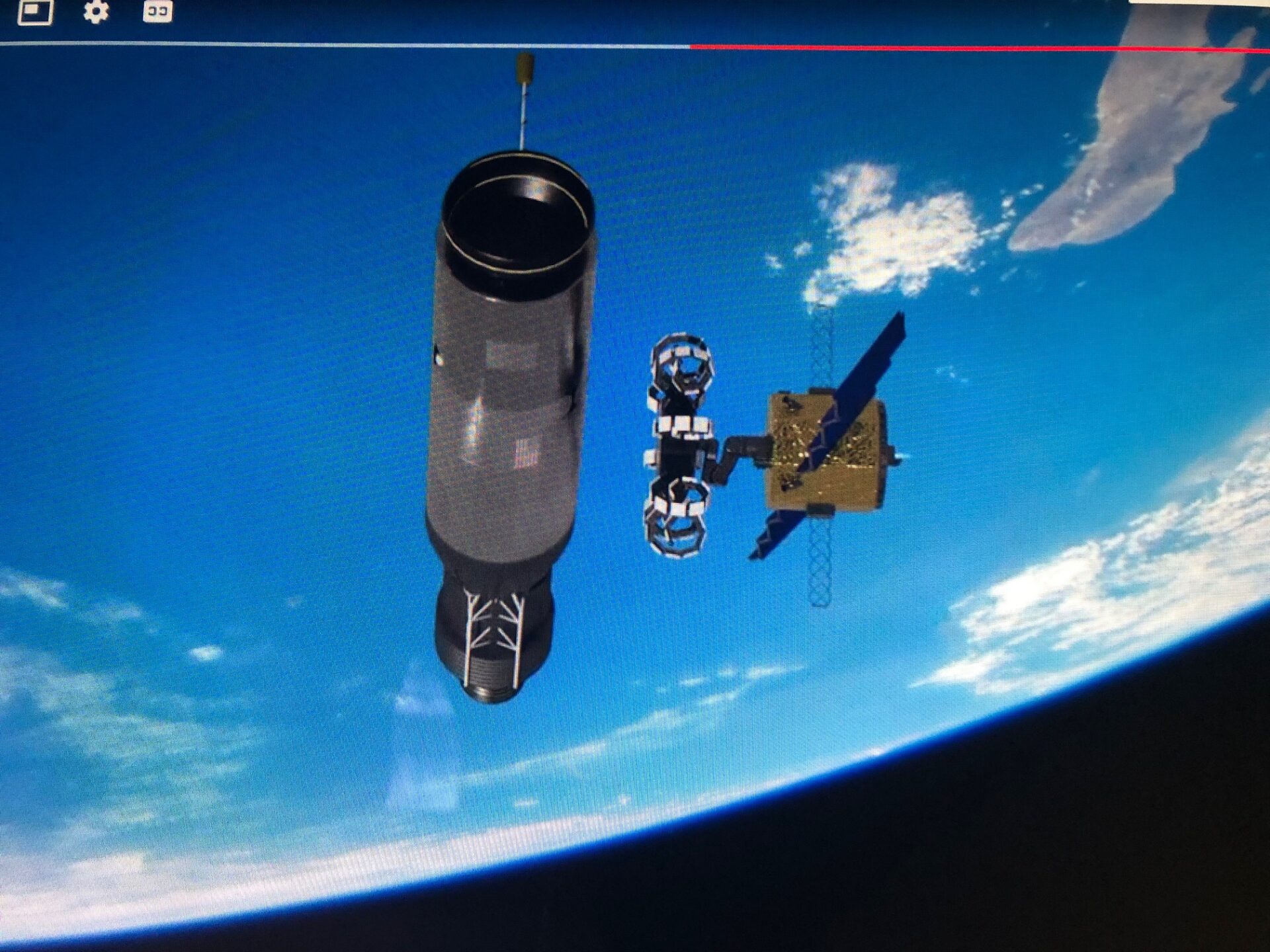Folks of a certain age can probably remember the time when littering wasn’t the transgression it’s considered to be today. That bag of McDonald’s garbage would just as likely end up on the side of the road as in any waste receptacle.
Thankfully, we’ve progressed to a point where we now recognize that the irresponsible dumping of everything from a hot cigarette butt to that old fridge breaks the social contract of environmental responsibility.
Take a close look at historical photos of Marquette and you’ll see trash in the streets, unlike anything we would expect to see today. Now, the ideal landscape is free of anything but the natural flora and fauna.
So… job done, right? Nope. We still have plenty of trash to clean up, but it’s out of sight to most of us. It’s in the sky, and in our seas. And it’s currently the target of a couple of local entities determined to put the trash where it belongs.
The Friendly Skies
Take a look at our beautiful skies and all you see is the heavenly sight of the sun and moon, and billions of stars. What you don’t see is the billowing cloud of space junk… the millions of pieces of dangerous debris orbiting the earth, abandoned, after decades of off-earth exploration.
You’ve probably never heard of Kall Morris Incorporated. They’re one of the many new entrepreneurial firms headquartered in Marquette, and they’re quietly working on an underreported project… the cleaning up of space.
Troy Morris, Kall Morris co-founder and Director of Operations, indicates the space cleaning industry is just getting ramped up, and none too soon. “New technologies and techniques” are facilitating this critical step in further space exploration.
Here’s the problem… most of the objects that have been sent into space, whether they’re operational or not, are still there. Those that are out of commission serve no purpose other than that of an obstacle course for those that are serving important roles in everything from state security to world-wide communications.
According to a recent article in The Week, NASA says there are currently about 23,000 pieces of orbital debris larger than a softball, half a million pieces the size of a marble or larger, and about 100 million smaller than that, orbiting the Earth. Traveling at speeds up to 17,000 miles per hour, any one of those pieces is capable of taking out, or seriously damaging, anything from an important satellite to the international space station, if a collision were to occur.
Most of the operational objects in orbit around our earth are the satellites that facilitate many of the services we rely on daily. And thousands more are joining the flock every year. Though space may seem infinite, low earth orbit, or LEO, has it’s limits. And the more things we send up there, the more crowded it becomes. Collisions between obsolete objects only result in more pieces of dangerous debris, which results in more collisions, and so on and so forth.
Kall Morris is on the forefront of the effort to clean up space. You can visit their website at kallmorris.com to get the technical info, but for the layman, here’s the simple explanation. The goal is to identify the location and characteristics of a piece of junk… something like an abandoned launch booster, send up a retrieval vehicle, grab the junk, and either repurpose it in space or bring it back to an earthly landfill. Simple, huh?
With a full team of engineers and scientists, including something called a mechatronics engineer, Kall Morris works primarily under contract with the United States Space Force… the new division of the U.S. Air Force. Though their work is still in the infant stages, it’s exciting to think this nascent industry has established a technological launch site right here in Marquette. New legislation has been written that now forces the cleanup of any space junk within five years of its deactivation. With that commitment in place, firms like Kall Morris have a brighter future, as well as the ability to expand their services and establish a more secure nerve center. In fact, though they’re able to work efficiently within the remote dynamic, a central office somewhere in Marquette is in their future plans.
If space is, in fact, the final frontier, we need to treat it better than we have the earth in our short time here. It’s nice to know that firms like Kall Morris are taking the lead.
Under Water
Just like it takes a spacesuit for a close up view of our lofty litter, you’ll need a wetsuit to get a good look at our deep sea detritus.
Okay… maybe it’s not so deep, but there’s certainly plenty of trash at all depths that threatens the health and vitality of Lake Superior, as well as every other body of water across the planet.
Though they’re not trying to clean up all the waters of the world… yet, the Great Lakes Scuba Diving and Lake Preservation organization, led by President Don Fassbender, is making a dent, one dive at a time.
Fassbender, an experienced diver, recognized the problem the very first time he put his head under water. “I started diving in 1990 and saw a need for this almost immediately.” Since then, his singular efforts have grown into a coordinated program of regularly scheduled group dives, resulting in the removal of truckloads of trash discarded into our sparkling Superior.
“During the first cleanup, volunteer divers and surface support removed 4 tons of tires and all kinds of trash including bikes, construction barrels, you name it. Seeing how much trash remained, I realized that there is a great need for this kind of thing and that I would need a lot of help if we were to continue doing this, and so I took the advice of a few individuals who came to my aid early on and formed the non-profit Great Lakes Scuba Diving and Lake Preservation group.”

A refrigerator being plucked out of the lower harbor.
Closer to home than space, but just as “out of sight,” our lakes have become handy dumping grounds for everything from old tires to obsolete appliances to plastics of all kinds, and every other piece of trash you can imagine. And more than just spoiling the natural beauty of water world, debris in our lakes impacts aquatic habitat, injures or kills fish and other wildlife, interferes with navigation safety, and can pose a threat to human health.
With every single-use plastic bag he tucks into his collection sack, Fassbender’s disappointment in his fellow humans comes to the surface. “I don’t understand the whole ‘out of sight out of mind’ mentality. People dump their garbage under cover of night mostly because they don’t want to get caught, but I suspect a fair number know it’s wrong and bad for the environment. I hope that as more and more people see what we’re doing and educate themselves on the dangers to the environment that we see a lot less of that sort of thing. Unfortunately, some folks are slow to learn a lesson and many just don’t care.”
Like every other social obligation we assume as concerned citizens, the proper disposal of trash needs to be our commitment to the health of this place we call home. Whether it’s Low Earth Orbit, or Lake Superior, or Harlow Park for that matter… it’s incumbent upon each of us to leave it better than we found it. Thanks to people like those at Kall Morris and Great Lakes Scuba Diving and Preservation, there’s a path to follow, and hope for the future.


